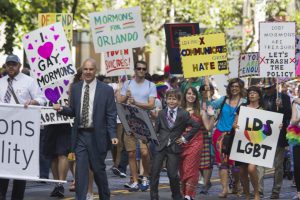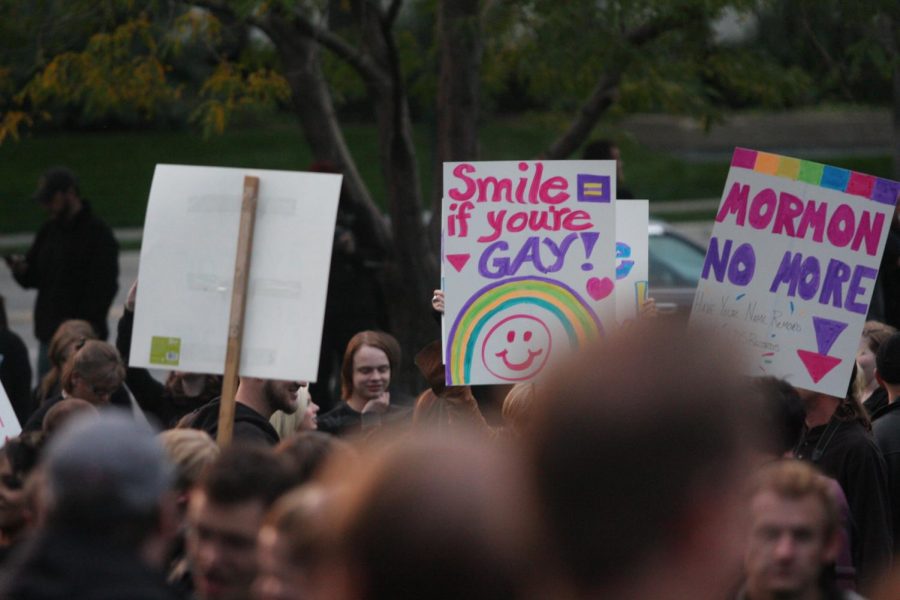Maxfield: New Ministerial Language Isn’t Enough to Reframe a Shaming Ideology
Members of the gay community hold up signs protesting a General Conference address from Boyd K. Packer and the Church of Jesus Christ of Latter Day Saints’ position on homosexuality. (Photo by Richard Payson | The Daily Utah Chronicle)
March 30, 2020
For most of my life, I was an active member of The Church of Jesus Christ of Latter-day Saints. I even served an honorable mission some years back. But, I no longer identify with many of the religion’s ideologies — including that members of the LGBTQ+ community are not permitted to live their truth within their religion. Consequently, I choose to no longer participate.
I don’t feel compelled to have my name removed from church records — but I wonder how long it will be before they add me to the freshly renamed group of people who are no longer welcome as members. While the catchy new phrase “withdrawal of membership” sounds delightfully better than “excommunicated,” the outcome is the same and is often involuntary.
Though I fundamentally disagree with some of the Church’s tenets, neither I nor anyone else can fairly take issue with a private organization establishing membership boundaries. This organization, however, actively shuns a private existence in favor of publicly proselytizing to the world and making claims of sole religious superiority. It ignores science by identifying same-gender attraction as something one must overcome, promising members that such urges can be diminished through interacting and serving others. Similarly, the church shames all behavior it deems immoral — hurting people along the way — making scrutiny fair and necessary.
Discrimination Framed as Love
Many changes have occurred in the years since I left, including the recent decision to offer a new, online general handbook for all to read. Church leaders released the handbook with nine rewritten chapters in mid-February. Language changes attempt to capture “a more ministerial voice.” I applaud this move towards transparency, because all active and potential members deserve clarity regarding church policies and practices.
Leaders state that the new handbook “seeks to be Christ-centered and principle-focused rather than just process-focused.” Perhaps in time, the treatment given to our fellow humans who are LGBTQ+ will also become Christ-centered. They currently experience discriminatory treatment similar to the ostracization of black church members from 1852 to 1978.
This Church has far to go before its claims of being a “thoroughly integrated faith” that “embraces the universal human family” can ring true. Interestingly, church policy regarding gender orientation contradicts an embraced Book of Mormon scripture, which states “he inviteth them all to come unto him and partake of his goodness … and all are alike unto God.” This should come as no surprise, since it took 126 years to treat its black members equally, despite the modern scripture explicitly stating that Chris loves everyone, “black and white, bond and free.” When God says all, I certainly believe He means all.
“Old Enough” To Covenant, But “Too Young” To Know Self
Many church policies are stigmatizing and shaming — particularly for adolescents who are forced by parents to attend. Minors are not free agents — they are subject to the rule of their parents. Yet, the church believes that children at age 8 have reached “the age of accountability” and possess the requisite wisdom to choose baptism. If an 8-year-old is well-informed enough to accept responsibility for church membership, why are their later claims regarding gender identity and sexuality invalid? Any church proclaiming “a place for all” must treat all members under age 18 equally.

(Courtesy Flickr)
The Price of Authentic Living
If you are an adult gay Latter-day Saint, you have tough choices. Living your truth and acting on your natural-born sexual attraction constitutes a violation of church policy, meaning you will soon face membership restrictions. The church’s moral code stipulates that sexual relations “are reserved for a man and woman who are married and promise complete loyalty to each other.”
Never mind that many active heterosexual members regularly violate marital promises of “complete loyalty” in various ways. Actions consistent with compulsive sexual behavior disorder — commonly referred to as sexual addiction — are widespread within the church. It seems one only has to pretend all is well or lie. If you minimize behavior considered immoral by the church and give the right answers, you are welcome to fully participate — even as honest, openly gay and transgender members are not.
Not All Are Welcome
The church presents contradicting narratives. Prominent signs on chapels read, “All Visitors Welcome.” Formal statements like one from Elder D. Todd Christofferson claim “we know there is room in this Church for everyone.” Yet church policy fails to welcome all members equally, leaving many to awkwardly choose sides.
The updated policy specifies how transgender people must conform to fully participate in the faith. Forced to live counter to their identity — to keep or gain moral worthiness — they must forego self-expression and often the rich personal fulfillment found in close, intimate relationships with people to whom they are attracted.
Ironically, the church refuses to take a stance on the cause of people “identifying themselves as transgender.” Their scripture proclaims, “we are all alike unto God,” so why should the root cause one’s race, gender, sexuality or physical disability make any difference?
Controlling How to Dress, Groom and Treat the Body
Church policy warns against “elective or surgical intervention” and “social transitioning.” Social transitioning is defined as “changing dress or grooming, or changing a name or pronouns, to present oneself as other than his or her birth sex.” Seriously? Telling members how to dress and groom themselves is an interesting directive from a church that preaches agency. Oddly enough, no similar stipulations restrict membership status for those who eat themselves into gastric bypass surgery.
Why are church leaders bent on micromanaging any medical choices of its members? What difference is it to them which pronouns members use? Women who marry and take on their husband’s surname legally change their names, so what is up with the admonition not to change one’s name? These statements are wildly controlling and beyond ridiculous.
Love Saves Lives
Attending a church or participating in a religious culture hostile to one’s identity is shown to create trauma. Complex tensions stem from such conflicted personal and religious ideologies. For many, religion provides a wonderful and welcoming environment— a harbor in a dark world. Sadly, for others, religion delivers strong messages of rejection.
In Utah, youth suicide rates are steadily climbing. This fact should demand the attention of Utah’s religious and legislative leaders, who must do more to include and protect all minors regardless of their gender or sexual identity. How many suicides of young, scared and shunned teenagers will be tolerated in the name of moral superiority?
While many factors may influence the sad, final act of taking one’s own life, we cannot overlook the impact of shaming religious ideologies on teens. We cannot know their pain or begin to understand what led to the decision to end their life. But we can love the living better by increasing tolerance and acceptance of all, because “we are all alike unto God.”







